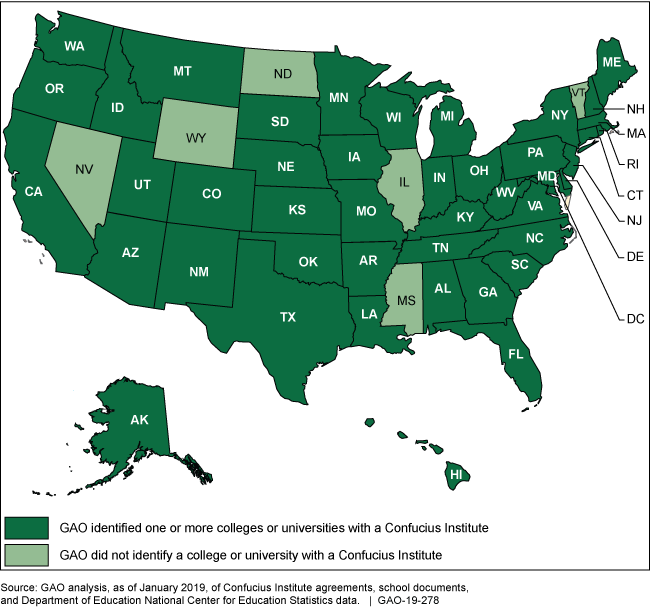China: Observations on Confucius Institutes in the United States and U.S. Universities in China
Fast Facts
The United States and China have established various higher education partnerships—there are nearly 100 Confucius Institutes at colleges and universities in the United States, and more than a dozen U.S. universities have opened institutions in China.
This testimony discusses our February 2019 report on Confucius Institutes in the United States and our August 2016 report on U.S. universities in China. In those reports, we noted that:
Confucius Institute establishing agreements were similar to one another, but institute operations varied.
U.S. universities in China emphasized academic freedom, but faced challenges such as internet censorship.
All but Six U.S. States Have at Least One Confucius Institute on University Campuses

Shaded map showing 44 states and the District of Columbia where Confucius Institutes are located
Highlights
What GAO Found
GAO reviewed 90 agreements establishing Confucius Institutes and spoke to officials about benefits and concerns related to the institutes. Agreements between Hanban—an affiliate of the Chinese Ministry of Education—and U.S. colleges and universities generally describe similar activities, funding, and management, though institute operations vary in practice. Confucius Institutes receive funding from Hanban and U.S. schools, and do not receive direct federal funding. While 42 of 90 agreements contained language about the document being confidential, some were available online or upon request, and one-third of the 90 agreements explicitly addressed how U.S. school policies apply to the institutes. Officials GAO interviewed at 10 case study schools noted U.S. school policies apply to institutes at their schools. GAO also interviewed some researchers and others who expressed concern that the presence of Confucius Institutes could constrain campus activities and classroom content. For example, several suggested schools with institutes might avoid hosting events on topics that could include criticism of China, such as Taiwan or Tibet, so as to not offend Chinese partners. School officials offered examples to illustrate that these concerns did not apply to their institute, noting institutes had sponsored events on such topics. Nonetheless, school officials and others suggested ways schools could improve institute management, such as renegotiating agreements to clarify U.S. schools' authority and making agreements publicly available.
Colleges and Universities across the United States Have Confucius Institutes on Campus

In August 2016, GAO reported that U.S. universities that have partnered with Chinese universities to establish degree-granting institutions in China emphasize academic freedom, but face internet censorship and other challenges. The 12 U.S. universities GAO reviewed generally reported receiving support for their institutions in China from Chinese government entities and universities, and 5 reported receiving U.S. government funding, mostly federal financial aid to U.S. students. Universities' agreements with Chinese partners or other policies GAO reviewed generally included language protecting academic freedom or indicating their institution in China would adhere to U.S. standards. University members generally indicated that they experienced academic freedom, but also stated that internet censorship, self-censorship, and other factors presented constraints. At several universities that lacked uncensored internet access, faculty and students noted that, as a result, they faced challenges teaching, conducting research, and completing coursework at that time.
Why GAO Did This Study
Numerous U.S. universities and colleges have partnered with Chinese entities to establish (1) Confucius Institutes in the United States and (2) degree-granting institutions in China. Confucius Institutes are partnerships between Chinese entities and schools in other countries, arranged and funded in part by Hanban, which seek to promote Chinese language and culture. There were 96 institutes located at colleges and universities in the United States as of January 2019. U.S. universities have also partnered with Chinese universities to establish degree-granting institutions in China approved by the Chinese government.
School officials have noted these types of partnerships provide valuable educational, cultural, and other benefits. Some researchers, government officials, and others, however, have raised concerns about them, including about the contents of written agreements and the role of the Chinese government, which, according to the Department of State, has made efforts to restrict academic freedom and impose censorship at Chinese universities and other institutions. Some have expressed concern that U.S. universities partnering with the Chinese government may face similar restrictions.
This testimony discusses funding, agreements, and operations of (1) Confucius Institutes in the United States and (2) U.S. universities in China. This testimony is based on GAO's February 2019 report on Confucius Institutes in the United States and GAO's August 2016 report on U.S. universities in China.
For more information, contact Jason Bair at (202) 512-6881 or bairj@gao.gov.
